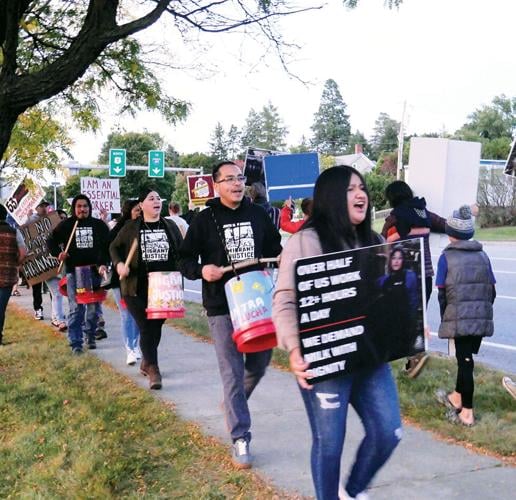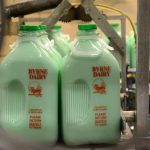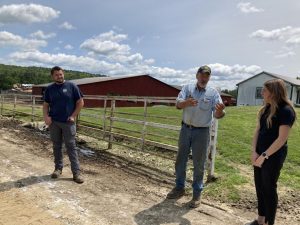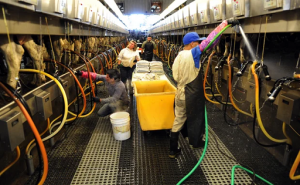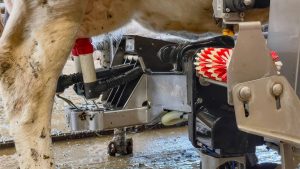
Farm workers, advocates and allies rallied at Hannaford grocery store locations in South Burlington earlier this month in a continued effort to pressure the company to improve working conditions for migrant dairy farmers.
The latest string of pickets across the state is a continuation of nearly five years of work to push the mass grocer and major dairy buyer to join the Milk with Dignity campaign, spearheaded by Vermont-based advocacy organization Migrant Justice, which asks the company to take responsibility for human rights abuses in its dairy supply chain.
This October has been a month of action for the advocacy organization with similar protests popping up in Morristown, Williston, Middlebury, along with Portland and Belfast, in Hannaford’s home state of Maine, where the team was last week.
“Currently, Hannaford’s store brand milk is coming from farms where workers are being abused and their rights are being violated. Farm workers are asking Hannaford to join this program, which would ensure that the company sources from farms that are treating workers with dignity and respecting their rights,” organizer Will Lambek said.
The campaign asks that farms comply with a code of conduct, which was developed by farm workers themselves, that sets standards for wages, scheduling, health and safety and creates enforceable protections against abuses like child labor and sexual harassment and violence.
A recent survey conducted by Migrant Justice and scientific researchers with the University of Massachusetts found that of the nearly 200 migrant dairy workers surveyed, nearly 87 percent were being paid below the minimum wage. Fifty percent reported working 12 or more hours a day with one in four workers working seven days a week without a day off. About 75 percent of workers have had work-related injuries and illnesses due to lack of training and lack of protection. Four in five workers report issues with housing ranging from a lack of heat to overcrowding to pest infestations like bed bugs, cockroaches and rodents, Lambeck said.
The most recent campaign against Hannaford started nearly two years after bringing Ben & Jerry’s — the first dairy supplier to sign onto the campaign — into the program in 2019.
“But Hannaford has never sat down with farm workers to have a discussion about conditions in their supply chain and how to ensure respect for workers’ human rights,” Lambeck said. “Migrant Justice began by reaching out to Hannaford to try to establish a meeting, and when the company ignored us, that’s when the organization launched a public campaign to let consumers know about the conditions in the company’s supply chain.”
He noted that Hannaford has never offered any solutions to improve farm workers’ lives.
Enrique Balcazar, a former farmworker who has been in Vermont for nearly a decade, now works as a community organizer for Migrant Justice, focused on the Northeast Kingdom. In an interview translated by Lambek, he told The Other Paper that conditions on many of the farms have remained the same as when he began the work nearly a decade ago.
“It’s been a decade now since I’ve worked on a farm, and unfortunately, the conditions in the industry haven’t improved,” Balcazar said. “Some of the farms that I worked at have since closed down. The others still employ immigrant workers, and they’re still facing the same issues that I would be facing 10 years back.”
Part of the issue, Balcazar said, is that there’s no protection for farm workers when it comes to unjust firing and since many of the farm jobs also include a place to live, that poses its own set of problems.
“Because the bosses need you to be there 24 hours a day, seven days a week, they want workers to live on the farm,” he said. “Being fired means that you lose your housing as well, and you’re out of a job.”
Migrant Justice is asking consumers to boycott Hannaford-brand milk and to contact the store’s corporate offices to show support for the campaign. The organization has also already received back nearly 400 consumer pledges.
“It’s difficult because Hannaford has really increased their security and they’re trying to limit our contact with the store’s customers. But even despite that, we’e able to have a lot of great conversations,” Balcazar said.
Ericka Dodge, director of external communications and community relations for the grocer, wrote in a statement that the company has been clear that it will not join Migrant Justice’s Milk with Dignity program in part because it is limited in both scope and impact.
“The concerns facing agricultural workers — and migrant workers in particular — are systemic, complex and extend well beyond Hannaford’s private label dairy supply chain.”
She said that while the two share the same goals of safeguarding the dignity and well-being of farm workers, Hannaford differs from Migrant Justice in its approach of achieving what they call a sustainable, long-term solution.
“Hannaford has a long history of success as a leader in solving complex supply chain issues — and we have done so with partners who are respectfully and collaboratively engaged in problem-solving. Unfortunately, from our perspective, this is not the approach that Migrant Justice has taken with us.”
In a written statement in 2023, the company said that it had implemented the National Dairy Farmers Assuring Responsible Management tool, a comprehensive program to support farmers in building safe work environments and is currently being utilized by more than 3,000 farms across the country. The company requires its private label suppliers to deploy the FARM assessment and the FARM Workforce Development Evaluation Tool, which includes environmental practices, animal welfare housing and workforce conditions.
“Utilizing the tool, our suppliers have assessed working conditions at 70 of Hannaford’s private label milk suppliers across our marketplace,” the company wrote. “While this work is ongoing, to date these assessments have covered more than 500 farm workers. Any findings are addressed with farmers in real-time.”
Other efforts by the company like implementing a complaint hotline, standards of engagement and farmer self-assessments are what Migrant Justice refers to as “knock-off Milk with Dignity programs” that offer no real positive changes for workers.
“There have been all these responses from the company basically to try to trick consumers into thinking that Hannaford actually is taking action to protect workers,” Lambeck said. “But the base reality, the experience of farm workers, has remained unchanged through all these years.”
You can now read the most important #news on #eDairyNews #Whatsapp channels!!!
🇺🇸 eDairy News INGLÊS: https://whatsapp.com/channel/0029VaKsjzGDTkJyIN6hcP1K
